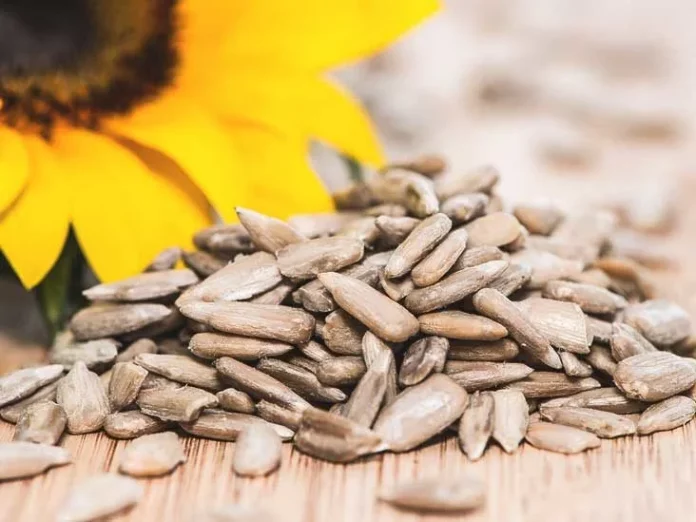Though chia and flax seeds often receive much of the nutritional attention, benefits of sunflower seeds have much to offer as well. Packed full of healthy fats, protein and fiber – sunflower seeds provide ample nourishment.
Sunflower seeds are packed with vitamin E, antioxidants, folate, phosphorus and selenium – essential ingredients that provide anti-inflammatory benefits while simultaneously lowering cholesterol levels in the blood.
High in Vitamin E
Bakula flower seeds provide nearly half your daily vitamin E needs in just an ounce, helping protect against the oxidation of fats in your blood, which is important in lowering risks of heart disease, stroke and other cardiovascular issues . Furthermore, sunflower seeds contain other protective plant compounds which fight free radicals – flavonoids and phytochemicals such as helianthin – as well as protection from short-term and chronic inflammation, along with reduced risks of chronic illnesses .
Sunflower seeds provide our bodies with both zinc and folate – essential elements to healthy pregnancies as it prevents birth defects such as spina bifida. Furthermore, consuming sufficient zinc promotes bone health while also aiding immune function.
Low in Calories
Sunflower seeds are low-cal and nutritious snacks that you can incorporate into granola bars, salads, soups or use as garnish on chicken or vegetable side dishes. Just be wary when eating too many seeds at once since their sodium and caloric content could increase quickly.
Sunflower seeds are rich in phytosterols, which may help lower cholesterol and protect against cardiovascular diseases by blocking fat absorption in the digestive tract. Fiber from sunflower seeds also aids bowel movement regulation; adding more high fiber foods could even alleviate constipation for those who experience it or reduce their dependence on laxatives or enemas.
High in Fiber
Sunflower seeds are an excellent high-fiber food to keep you feeling full for longer, aid in digestion and lower cholesterol levels. Incorporating magnesium, potassium and vitamin E. However, be sure to read labels before purchasing; many packaged sunflower seed products contain an excessive amount of sodium (one popular brand contains 70% of your daily recommended intake per serving).
Sunflower seeds may help reduce chronic inflammation by lowering C-reactive protein levels – an indicator of cardiovascular disease and diabetes risk. Furthermore, vitamin E found in these seeds supports immune function while also protecting LDL “bad” cholesterol from being oxidized by your body.
They contain phytoestrogens, plant-derived molecules with hormone-like effects. Research has linked phytoestrogens with lower risks of cardiovascular diseases, metabolic disorders and breast cancer among women.
Add sunflower seeds to yogurt, cottage cheese, salads or low-fat smoothies for an energizing and tasty snack! When selecting raw, unsalted varieties you will gain maximum health benefits; be mindful when serving yourself too many, as they contain both fats and calories; too much could cause constipation or diarrhea so it is vitally important that enough water be consumed when taking them in.
High in Protein
Sunflower seeds are packed with protein and an excellent source of vitamin E, plus magnesium, potassium and fiber for reduced cholesterol and blood pressure levels. You can enjoy sunflower seeds raw or roasted as part of any meal!
Sunflower seed kernels contain high concentrations of soluble fibers that help improve digestive health and regulate blood sugar. Their fat and protein contents also provide satiation to manage hunger and appetite more effectively.
Sunflower seeds contain essential antioxidants like vitamin E and selenium that act as immune system boosters by combatting free radical damage to the body. Sunflower seeds also offer vital minerals like zinc and iron which support bone health, metabolism and immunity – great additions for trail mix or salad toppings!
Low in Cholesterol
Sunflower seeds offer an abundance of essential vitamins and nutrients to support heart health, with low saturated fat content. Eating one ounce daily of these nutty snacks could potentially lower “bad” cholesterol levels and blood pressure.
Folate (vitamin B-9) and vitamin E are abundantly found in eggs. Folate promotes cell growth during gestation, working alongside vitamin B-12 to form hemoglobin, an essential protein component of red blood cells.
Sunflower seed kernels offer additional advantages by being high in plant-based fatty acids and phytochemicals, including helianthin, squalene, and tocopherol – compounds which provide cardiovascular protection by blocking angiotensin-I converting enzyme that narrows blood vessels and raises blood pressure
Sunflower seeds contain beta-sitosterol, an organic sterol found in plants that helps prevent breast cancer by binding with estrogen receptors and blocking certain hormones such as testosterone. Vitamin E and selenium also act as powerful antioxidants to help combat inflammation in the body

















